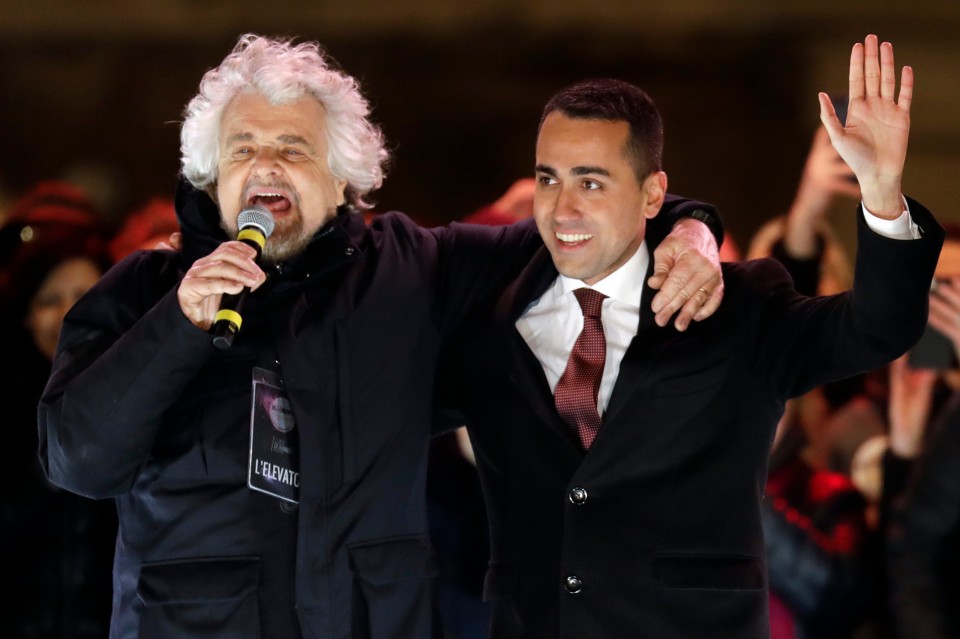Mario Monti was prime minister of Italy from 2011 to 2013.
MILAN — Italy’s general elections Sunday dealt a severe blow to the trend that had emerged in major European Union countries over the last year. After the Brexit referendum, Emmanuel Macron’s victory in France and the elections that finally brought a renewed grand coalition under Angela Merkel in Germany led many to believe that the tide of populist euroscepticism was over.
Not so in Italy. With nearly all ballots counted, the populist Five Star Movement is ahead with an impressive near 33 percent of the vote. The Democratic Party, that of Prime Minister Paolo Gentiloni as well as his two predecessors, Enrico Letta and Matteo Renzi, follows at 18 percent — a huge loss for the party that won 40 percent of the vote in European Parliament elections in 2014. The League, a right-wing, anti-immigrant party led by Matteo Salvini, beat its former coalition partner, Silvio Berlusconi’s Forza Italia, by four percentage points.
This huge turmoil, which is going to create yet another nightmare for the EU, cannot be labeled simply as a triumph of Italian euroskeptic populists. The populists’ success is not just a reward for their hard work. It is also the unintended result of the devious attitude and ambiguous language toward the EU used by the leaders of two supposedly non-populist parties, Forza Italia and the Democratic Party.
By blaming Europe for nearly everything that went wrong during their respective times in government, Berlusconi and Renzi paved the way for Salvini and the Five Star Movement’s Luigi Di Maio by instilling into the minds of Italians for years the anti-EU reflex on which the League and the Five Star Movement finally so skillfully capitalized. In the end, Italians have shown that they like the original populists better than the disguised ones. Equally, it was not easy for Renzi and Berlusconi to portray themselves in Europe as the bastions against Italian euroskeptic populists.
Foreign observers should avoid two misperceptions. First, the high tally for the populists does not mean that half of Italy has been seduced by the far right. Given Italy’s past, this should be a concern for Italians and foreigners alike. Although there are signs of growing sympathy for the right in some quarters, it would be unjustified to classify all Five Star Movement supporters as far-right or even right-wing. Also, neither CasaPound nor Forza Nuova, two overtly far-right movements, reached even one 1 percent of the vote.
The second misperception would be that the populists’ huge success has no reasonable basis. Unfortunately, this is definitely not the case. Italy’s economy has improved only very modestly and slowly after the 2011-2012 financial crisis, when the overarching priorities were to prevent the default of the state and to avoid ending up like Greece. That objective was achieved, but policy priorities in subsequent years were not sufficiently focused on stimulating growth and employment, particularly for young people. Greater efforts should have been deployed to fight tax evasion and corruption and to cut the privileges and rents enjoyed by the myriad of organized interests that amount to a straightjacket for young people, leading many youth to expatriate and others to give up hope.
So, a largely justified discontent, especially in the south, has erupted in an unprecedented political shake-up. It is now crucial that this trigger long-needed policy action rather than unproductive fights against the wrong targets. The populists have two main targets: the Italian establishment and the EU. They need to pick their fights well. It would be advisable to put in place a coordinated set of bold reforms to eliminate at least some of the most archaic features of the Italian establishment, both in the economy and in the public sphere. Many reform-minded, non-populist citizens would indeed welcome such initiatives and perhaps cooperate toward finally implementing them.
Dealing with the EU requires a high capacity for selecting the right issues and the appropriate strategies. It is high time, for example, that the EU recognize more explicitly that genuine and productive public investments are needed in most countries. Thus, the rules on fiscal discipline should be modified accordingly. At the same time, it would be unrealistic and actually harmful for today’s and tomorrow’s Italians to try and get rid of any form of EU budgetary rules. Equally, it would make sense that Italy, in the forthcoming negotiations on the future EU budget, insist that structural funds be conditional upon compliance of agreed principles of solidarity, in particular regarding immigrants and refugees.
As far as strategies for dealing with the EU are concerned, assertiveness is always a good thing; so is looking at precedents. The United Kingdom, for example, once had a tradition of skillful negotiation in EU matters, but it is clear that London is now in a self-inflicted fog after Brexit. With due respect to the youthful energy of Di Maio and Salvini, I am not sure that the EU, even under pressure of threats that Italy will leave the union or the euro, will show much greater flexibility than currently reserved for Her Majesty’s negotiators.
This was produced by The WorldPost, a partnership of the Berggruen Institute and The Washington Post.





